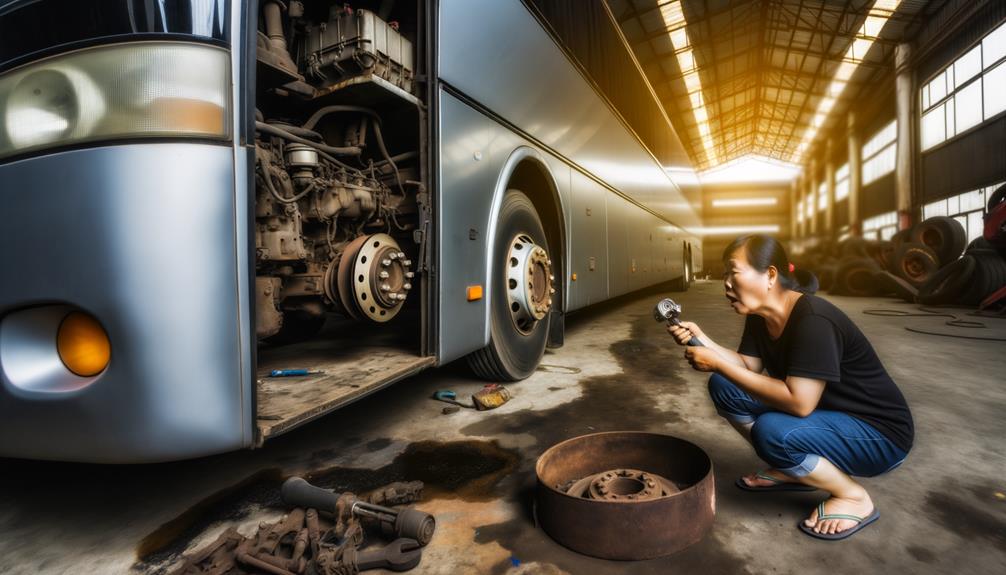Top Repairs Needed for Coach Buses
When it comes to maintaining coach buses, you know that certain repairs are more critical than others. You might find yourself prioritizing engine diagnostics or addressing transmission issues before they escalate. Brake system maintenance is another area that can't be overlooked, as worn components can jeopardize safety. But what about the other systems that often get sidelined? Understanding the full spectrum of necessary repairs can make a significant difference in performance and passenger comfort. Let's explore what you might be missing and how it could impact your operations.
Engine Diagnostics and Repairs
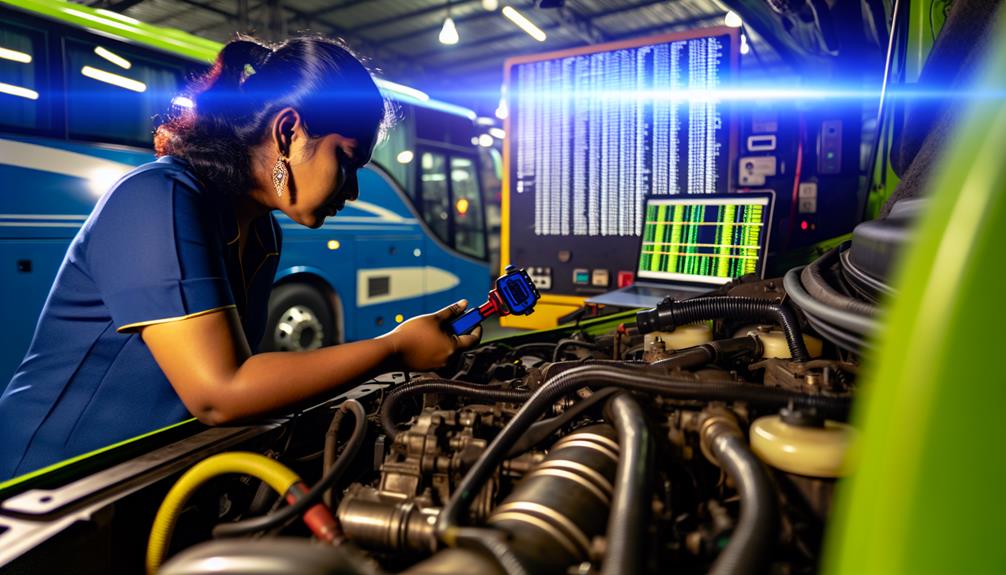
Engine diagnostics and repairs are vital for maintaining the performance and safety of coach buses. When you're on the road, you want to guarantee your engine runs efficiently. Regular diagnostics help identify problems early, preventing costly breakdowns and guaranteeing your passengers' safety.
You'll want to focus on the fuel system, as it plays a significant role in engine performance. Utilizing advanced diagnostic tools, you can assess your fuel injectors, fuel pumps, and filters. For instance, a clogged fuel filter can restrict fuel flow, leading to reduced engine performance. By identifying such issues through your diagnostic tools, you can address them promptly.
When performing engine diagnostics, pay attention to error codes from the onboard computer. These codes can indicate various issues, from sensor malfunctions to fuel pressure irregularities. With the right tools, you can analyze these codes and make informed decisions about repairs.
Transmission Issues
Addressing transmission issues is essential for guaranteeing the smooth operation of coach buses. When you encounter these problems, it's important to identify them quickly to prevent costly repairs or breakdowns. Here are some common transmission issues you should look out for:
- Low Transmission Fluid: Insufficient fluid can lead to overheating and shifting problems.
- Contaminated Transmission Fluid: Dirty fluid can cause wear and tear, impacting performance.
- Delayed Shifting: If your bus struggles to shift gears, this indicates a potential mechanical issue.
- Unusual Noises: Grinding or whining sounds while shifting can signal serious problems.
Regular inspections and maintenance can help you avoid these issues. Always check the transmission fluid levels and quality, as inadequate fluid can lead to severe shifting problems. If you notice any signs of trouble, addressing them promptly will guarantee that your coach bus operates smoothly. Remember, a well-functioning transmission not only enhances performance but also provides the freedom you crave on the road. Stay vigilant, and give your vehicle the attention it deserves to maintain that freedom.
Brake System Maintenance
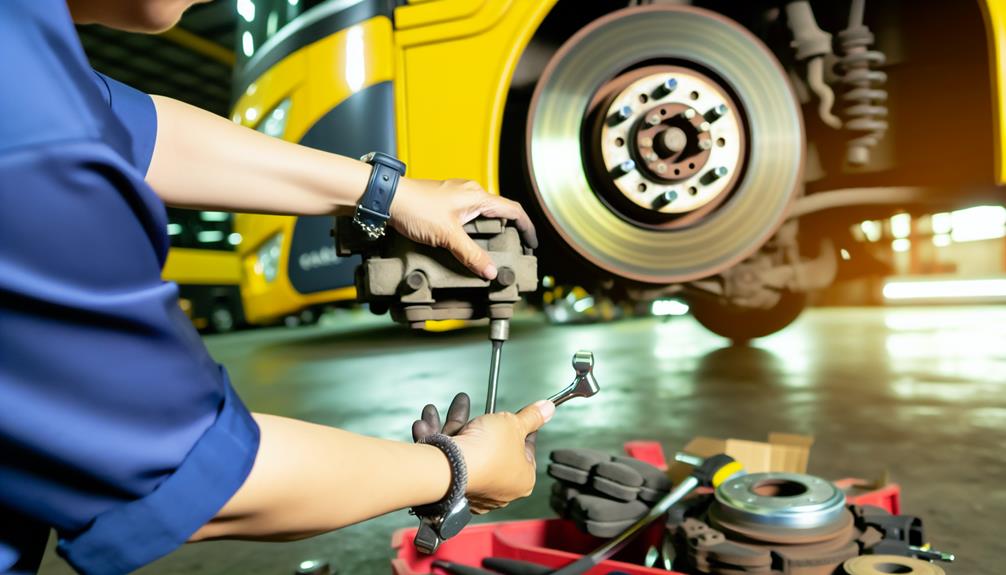
When it comes to maintaining the safety and performance of your coach bus, the brake system is essential. Regular inspection and maintenance of components like brake pads and brake fluid can prevent serious issues down the road. You should check the brake fluid level frequently, as low fluid can lead to reduced braking efficiency. If you notice that the fluid appears dark or contaminated, it's time for a change.
Brake pads are another vital element. Inspect them for wear and replace them if they're worn down to the manufacturer's specified minimum thickness. Worn brake pads can compromise your stopping power and increase the risk of brake failure.
Additionally, listen for unusual sounds when applying the brakes. A grinding noise often indicates that the brake pads are worn out, while a squeaking sound can suggest that they're contaminated or need lubrication.
Electrical System Troubles
Electrical system troubles can frequently disrupt the operation of your coach bus, leading to potential safety hazards and costly repairs. To keep your bus running smoothly, pay attention to these critical issues:
- Wiring Harness Damage: Inspect the wiring harness regularly for frays or corrosion that can cause shorts.
- Battery Maintenance: Verify your batteries are clean and terminals are tight; poor connections can lead to power loss.
- Fuses and Relays: Check fuses and relays periodically to avoid unexpected failures.
- Ground Connections: A loose ground connection can create erratic electrical behavior, affecting multiple systems.
Addressing electrical issues promptly is essential. A damaged wiring harness can lead to widespread electrical failures, jeopardizing your safety and the performance of your bus. Additionally, neglecting battery maintenance can result in starting issues or even complete power loss while on the road. Regular inspections and proactive measures will not only extend the life of your electrical systems but also guarantee you enjoy the freedom of the open road without unexpected interruptions. Don't wait for problems to escalate; make electrical system maintenance a priority for your coach bus.
Suspension and Steering Problems
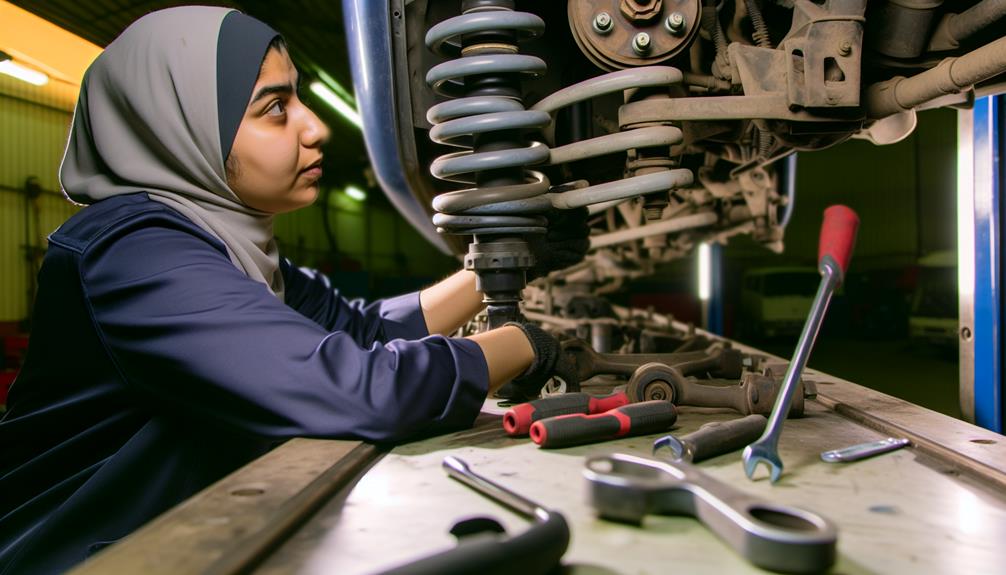
Suspension and steering problems can greatly impact the safety and handling of your coach bus, making regular maintenance essential. As you drive, any suspension wear can lead to decreased stability, resulting in a bumpy ride that irritates passengers and potentially jeopardizes their safety. If you notice unusual noises or excessive bouncing, it's a clear sign that your suspension system requires immediate attention.
Steering alignment is another critical aspect to monitor. Misalignment can cause your bus to pull to one side, making it challenging to maintain a straight path. This issue not only strains your steering components but also increases tire wear, leading to costly replacements down the line. Regularly checking the alignment guarantees that your bus handles smoothly, enhancing driver control and passenger comfort.
To mitigate these issues, schedule routine inspections for your suspension and steering systems. This proactive approach allows you to identify wear early, guaranteeing that your bus remains roadworthy and providing the freedom to travel without worry. By prioritizing these repairs, you're not just maintaining a vehicle; you're safeguarding the journey for everyone on board.
Air Conditioning Repairs
Maintaining a comfortable environment inside your coach bus relies on the proper functioning of the air conditioning system. When issues arise, it can lead to uncomfortable rides for you and your passengers. To keep your AC running smoothly, pay attention to these crucial repair areas:
- Refrigerant Leakage: This is a common issue that can greatly reduce cooling efficiency. Regularly inspect for leaks and recharge the system as needed to guarantee peak performance.
- Condenser Cleaning: Dirt and debris can accumulate on the condenser, obstructing airflow and causing overheating. Schedule routine cleaning to maintain efficiency and extend the lifespan of your AC unit.
- Compressor Functionality: The compressor plays a critical role in cooling. Listen for unusual noises or a lack of cooling, which might indicate a failing compressor that needs immediate attention.
- Thermostat Calibration: An improperly calibrated thermostat can lead to inconsistent temperatures. Regular checks and adjustments can guarantee your system maintains the desired comfort level.
Addressing these air conditioning repairs promptly will enhance passenger satisfaction and minimize downtime, allowing you the freedom to focus on the road ahead.
Tire Replacement and Alignment
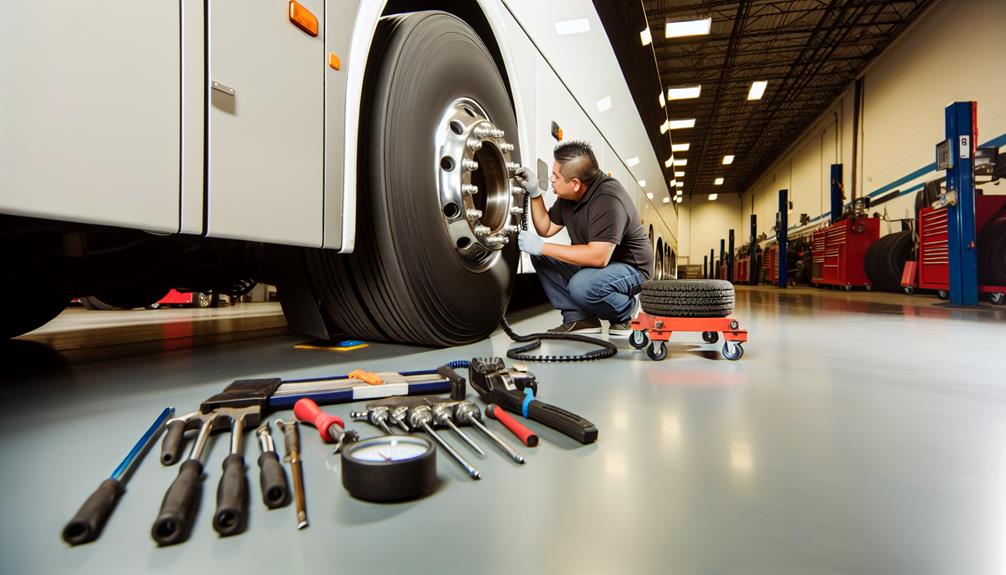
When it comes to guaranteeing safety and performance on the road, tire replacement and alignment are critical aspects of coach bus maintenance. You need to prioritize regular tire maintenance to prevent issues that can lead to unsafe driving conditions. Inspect your tires for tread wear, bulges, or cracks, and replace them as necessary. A well-maintained tire not only enhances fuel efficiency but also guarantees a smoother ride for passengers.
In addition to tire replacement, performing alignment checks is essential. Misalignment can cause uneven tire wear, reduced handling, and increased fuel consumption. Regularly scheduled alignment checks will help maintain peak tire performance and prolong their lifespan. If you notice vibrations, pulling to one side, or uneven tire wear, it's time to get an alignment check done.
Exhaust System Inspections
How often do you consider the importance of exhaust system inspections in your coach bus maintenance routine? Regular inspections can save you from costly repairs and guarantee a safe, efficient journey. Here are four critical aspects to focus on during your inspections:
- Exhaust Leaks: Check for any signs of leaks, which can lead to decreased fuel efficiency and harmful emissions.
- Muffler Replacements: Inspect your muffler for rust or damage. A failing muffler not only increases noise but also affects engine performance.
- Pipe Integrity: Examine exhaust pipes for cracks or corrosion. Compromised pipes can disrupt exhaust flow and lead to further issues.
- Hangars and Supports: Verify that the exhaust system is properly supported and that hangars are intact. Loose components can result in excessive vibration and damage.

